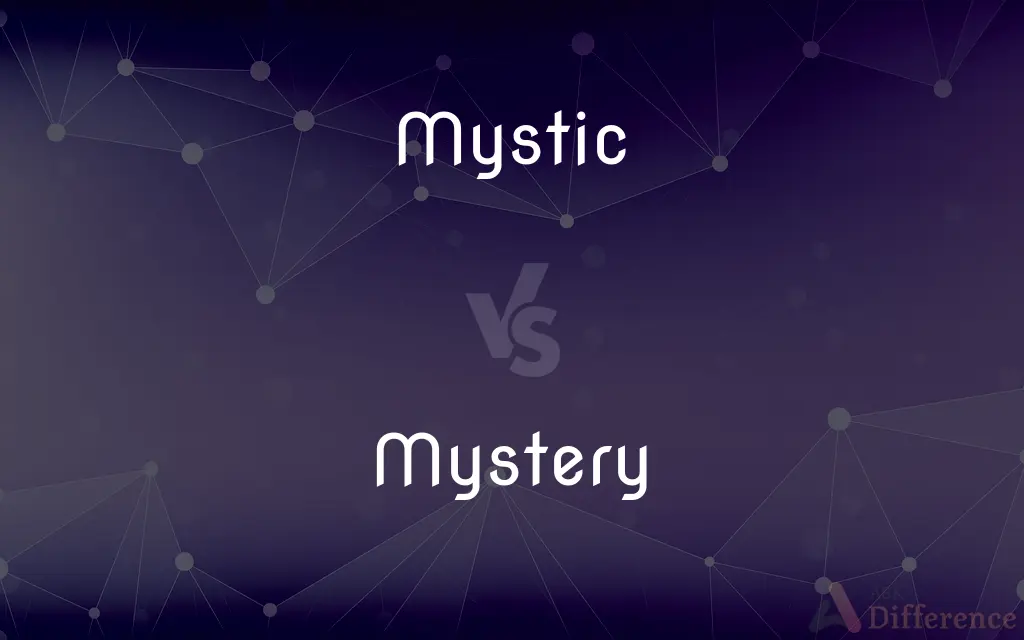Mystic vs. Mystery — What's the Difference?
Edited by Tayyaba Rehman — By Maham Liaqat — Updated on April 23, 2024
A mystic is a person who seeks spiritual truths and experiences deep spiritual union, often beyond ordinary understanding, while a mystery refers to something that is difficult or impossible to understand or explain.

Difference Between Mystic and Mystery
Table of Contents
ADVERTISEMENT
Key Differences
A mystic engages in practices and beliefs that aim to achieve a direct, personal experience of the divine or ultimate reality, often through meditation, prayer, and contemplation. In contrast, a mystery involves any event, situation, or subject that remains puzzling, obscured, or unexplained despite efforts to understand it.
Mystics often focus on inner experiences and insights as a path to enlightenment or spiritual awakening, highlighting personal transformation and the breaking of normal perceptual boundaries. On the other hand, mysteries can intrigue or confound a wide range of people, often sparking curiosity and speculative inquiry without necessarily leading to any definitive answers.
While mystics are typically associated with religious or spiritual traditions, where their experiences are sometimes considered sacred secrets, mysteries can be secular or religious and can encompass everything from crime mysteries to scientific anomalies.
The journey of a mystic is usually marked by stages of spiritual development, including trials, revelations, and moments of profound insight, which are personally transformative. Meanwhile, solving a mystery, such as a crime or a scientific question, often requires gathering physical evidence, deductive reasoning, and sometimes technological assistance.
Mystics may express their understanding through mystical writings or teachings, which can be cryptic and symbolic, intended to guide others on their spiritual paths. Conversely, mysteries, once solved, are typically explained in factual and concrete terms to clarify and resolve the questions they pose.
ADVERTISEMENT
Comparison Chart
Nature
Person
Concept or situation
Focus
Spiritual experiences and insights
Unknowns or unexplained phenomena
Associated Practices
Meditation, contemplation, prayer
Investigation, research, analysis
Outcome
Spiritual enlightenment
Explanation or resolution
Expression
Symbolic, allegorical writings
Factual, detailed accounts
Compare with Definitions
Mystic
Emphasizes personal spiritual experiences.
Mystics often report experiencing a profound sense of unity with the cosmos.
Mystery
Something that is difficult to explain.
The Bermuda Triangle remains a mystery to many researchers.
Mystic
Guides others spiritually.
Many mystics write texts that serve as guides for spiritual seekers.
Mystery
Invites investigation and curiosity.
The mystery of the missing artifact led to a large-scale archaeological hunt.
Mystic
Seen as possessing deeper, often esoteric knowledge.
The teachings of Christian mystics like Meister Eckhart remain influential.
Mystery
Solved through analysis and evidence.
Forensic science has solved many mysteries that were once thought inscrutable.
Mystic
Often associated with religious mysticism.
Sufi mystics are known for their deep poetic expressions of divine love.
Mystery
Often involves unexplained phenomena.
Paranormal activities are regarded as mysteries by many.
Mystic
A person seeking spiritual truth.
The mystic spent days in silent meditation.
Mystery
Can refer to literary genres.
Agatha Christie wrote mystery novels that captivated millions.
Mystic
Of or relating to mysticism or mystics
Mystic doctrines.
Mystery
One that is not fully understood or that baffles or eludes the understanding; an enigma
How he got in is a mystery.
Mystic
Deeply or mysteriously spiritual; mystical
Mystic experiences.
Mystery
One whose identity is unknown and who arouses curiosity
The woman in the photograph is a mystery.
Mystic
Of or relating to religious mysteries or occult rites and practices.
Mystery
A mysterious character or quality
A landscape with mystery and charm.
Mystic
Inspiring a sense of mystery or wonder
A painting of a mystic landscape.
Mystery
Something that is a secret
“From the first, some private trouble weighed on his mind, and since he chose to make a mystery of its cause, a biographer is bound to respect his wish” (Henry Adams).
Mystic
One who practices or believes in mysticism or a given form of mysticism
Protestant mystics.
Mystery
A work of fiction, such as a novel or a movie, that has a story centered around solving a puzzling crime or mysterious event.
Mystic
Of, or relating to mystics, mysticism or occult mysteries; mystical.
A mystic dance
Mystery
A nonfictional account of a puzzling crime or mysterious event presented in the manner of a mystery.
Mystic
Mysterious and strange; arcane, obscure or enigmatic.
Mystery
A religious cult practicing secret rites to which only initiates are admitted.
Mystic
Someone who practices mysticism.
Mystery
A secret rite of such a cult.
Mystic
Remote from or beyond human comprehension; baffling human understanding; unknowable; obscure; mysterious.
Heaven's numerous hierarchy spanThe mystic gulf from God to man.
God hath revealed a way mystical and supernatural.
Mystery
A religious truth that is incomprehensible to reason and knowable only through divine revelation.
Mystic
Importing or implying mysticism; involving some secret meaning; allegorical; emblematical; as, a mystic dance; mystic Babylon.
Thus, then, did the spirit of unity and meekness inspire every joint and sinew of the mystical body.
Mystery
An incident from the life of Jesus, especially the Incarnation, Passion, Crucifixion, or Resurrection, of particular importance for redemption.
Mystic
Employing mysticism; as, mystical intuition; mystical explanations; - contrasted to logical, rational, analytical.
Mystery
One of the 15 incidents from the lives of Jesus or the Blessed Virgin Mary, such as the Annunciation or the Ascension, serving in Roman Catholicism as the subject of meditation during recitation of the rosary.
Mystic
One given to mysticism; one who holds mystical views, interpretations, etc.; especially, in ecclesiastical history, one who professed mysticism. See Mysticism.
Mystery
Also Mystery One of the sacraments, especially the Eucharist.
Mystic
Someone who believes in the existence of realities beyond human comprehension
Mystery
Mysteries The consecrated elements of the Eucharist.
Mystic
Having an import not apparent to the senses nor obvious to the intelligence; beyond ordinary understanding;
Mysterious symbols
The mystical style of Blake
Occult lore
The secret learning of the ancients
Mystery
Often mysteries The skills, lore, or practices that are peculiar to a particular activity or group and are regarded as the special province of initiates
The mysteries of Freemasonry.
The mysteries of cooking game.
Mystic
Relating to or resembling mysticism;
Mystical intuition
Mystical theories about the securities market
Mystery
A mystery play.
Mystic
Relating to or characteristic of mysticism;
Mystical religion
Mystery
A trade or occupation.
Mystery
A guild, as of merchants or artisans.
Mystery
Something secret or unexplainable; an unknown.
The truth behind the events remains a mystery.
Mystery
Someone or something with an obscure or puzzling nature.
That man is a mystery.
Mystery
(obsolete) A secret or mystical meaning.
Mystery
A religious truth not understandable by the application of human reason alone (without divine aid).
Mystery
A sacrament.
Mystery
A secret religious celebration, admission to which was usually through initiation.
The Eleusinian mysteries
The Mysteries of Mithras
Mystery
(Catholicism) A particular event or series of events in the life of Christ.
The second decade of the Rosary concerns the Sorrowful mysteries, such as the crucifixion and the crowning with thorns.
Mystery
A craft, art or trade; specifically a guild of craftsmen.
Mystery
A profound secret; something wholly unknown, or something kept cautiously concealed, and therefore exciting curiosity or wonder; something which has not been or can not be explained; hence, specifically, that which is beyond human comprehension.
We speak the wisdom of God in a mystery.
If God should please to reveal unto us this great mystery of the Trinity, or some other mysteries in our holy religion, we should not be able to understand them, unless he would bestow on us some new faculties of the mind.
Mystery
A kind of secret religious celebration, to which none were admitted except those who had been initiated by certain preparatory ceremonies; - usually plural; as, the Eleusinian mysteries.
Mystery
The consecrated elements in the eucharist.
Mystery
Anything artfully made difficult; an enigma.
Mystery
A trade; a handicraft; hence, any business with which one is usually occupied.
Fie upon him, he will discredit our mystery.
And that which is the noblest mysteryBrings to reproach and common infamy.
Mystery
A dramatic representation of a Scriptural subject, often some event in the life of Christ; a dramatic composition of this character; as, the Chester Mysteries, consisting of dramas acted by various craft associations in that city in the early part of the 14th century.
"Mystery plays," so called because acted by craftsmen.
Mystery
Something that baffles understanding and cannot be explained;
How it got out is a mystery
It remains one of nature's secrets
Mystery
A story about a crime (usually murder) presented as a novel or play or movie
Common Curiosities
How do mystics share their insights?
Mystics often share their insights through writings, teachings, or oral traditions, which may be symbolic or allegorical to convey deep spiritual truths.
What are common types of mysteries?
Common types of mysteries include unsolved crimes, historical anomalies, paranormal activities, and scientific puzzles.
What skills are important for solving mysteries?
Important skills for solving mysteries include critical thinking, analytical reasoning, and often specific knowledge or technical abilities relevant to the field of study.
Can a mystic solve a mystery?
While a mystic's focus is on spiritual enlightenment, their insights may sometimes provide different perspectives on mysteries, though typically not in a conventional investigative sense.
Why are mysteries appealing?
Mysteries are appealing because they challenge the understanding, provoke curiosity, and engage the intellectual and imaginative faculties of individuals.
How does one become a mystic?
Becoming a mystic typically involves a dedicated spiritual practice, often within a specific religious or spiritual tradition, aimed at deepening one's connection and understanding of the divine.
Is mysticism confined to one religion?
No, mysticism is a part of many religious traditions around the world, each having its own practices and interpretations of mystical experiences.
Are all mystics religious figures?
Not all mystics are religious figures; some may simply be individuals deeply engaged in personal spiritual practices without affiliations to organized religions.
What defines a mystic?
A mystic is defined by a deep, personal pursuit of spiritual understanding and connection with a higher reality, often through introspective and contemplative practices.
What is the role of technology in solving mysteries?
Technology plays a crucial role in solving mysteries today, especially in fields like forensics, where it helps uncover and analyze evidence.
How do cultural differences influence the interpretation of mysteries?
Cultural differences can significantly influence how mysteries are interpreted, with various societies having different myths, legends, and scientific understandings that shape their responses to the unknown.
What is a mystery in simple terms?
A mystery is something that is unknown or unclear, characterized by aspects or qualities that are hidden or difficult to understand or explain.
What makes a mystery unsolvable?
A mystery may remain unsolvable if there is a lack of evidence, too much ambiguity, or it involves phenomena beyond current scientific understanding.
Can mysteries be harmful?
While mysteries often stimulate curiosity and research, they can be harmful if they lead to false beliefs, conspiracy theories, or neglect of scientific understanding.
How do mystics perceive the world differently from others?
Mystics often perceive the world through a lens of interconnectedness and spiritual depth, seeing beyond the material and conventional to a more profound sense of reality.
Share Your Discovery

Previous Comparison
Inequity vs. Inequality
Next Comparison
Check vs. GinghamAuthor Spotlight
Written by
Maham LiaqatEdited by
Tayyaba RehmanTayyaba Rehman is a distinguished writer, currently serving as a primary contributor to askdifference.com. As a researcher in semantics and etymology, Tayyaba's passion for the complexity of languages and their distinctions has found a perfect home on the platform. Tayyaba delves into the intricacies of language, distinguishing between commonly confused words and phrases, thereby providing clarity for readers worldwide.














































